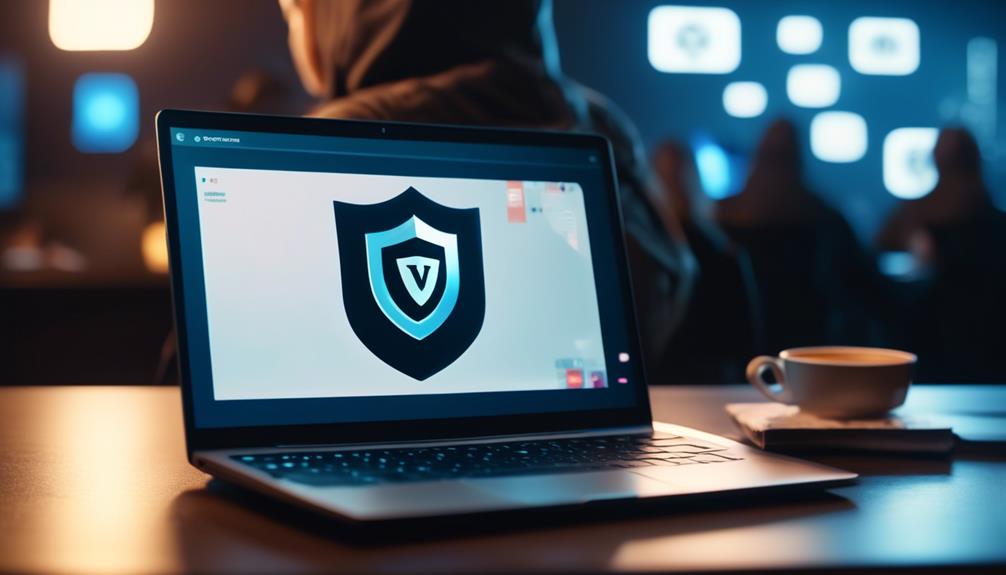In today's digital age, fortifying online privacy and defending against scams is essential. With cyber threats evolving, individuals seek reliable strategies to protect personal and financial security. The 13 steps outlined provide comprehensive guidance for enhancing online privacy and defending against scams. They empower individuals to navigate the digital landscape with confidence and resilience.
Understanding Personally Identifiable Information

Understanding Personally Identifiable Information (PII) is crucial. It includes personal details like name, address, email, and phone number. Safeguarding it against unauthorized access and misuse is essential. PII is highly valuable and can lead to identity theft and financial fraud. Medical records and family details also fall into this category, making them susceptible to misuse. Being mindful of how and where you share personal information is essential. PII can be obtained through data breaches, phishing campaigns, and targeted advertising. Setting social media profiles to private, using secure passwords, and being cautious online are important. These actions can enhance privacy and security, reducing the risk of unauthorized access and misuse.
Importance of Browsing Activity Protection
Safeguarding online privacy from intrusive tracking is crucial. Adjust privacy settings and utilize tools to prevent tracking. Browsers with built-in privacy features can limit tracking. Using alternative search engines like DuckDuckGo and Ecosia can enhance online privacy. These search engines prioritize user privacy and don't track personal information. Unique identifiers in cookies can be used to track browsing behavior. Taking proactive steps can better safeguard online privacy and reduce intrusive tracking.
Securing Messages and Email Content

Securing messages and email content is crucial for online privacy. It builds on browsing protection. To ensure security, use encrypted messaging apps with end-to-end encryption. This prevents unauthorized access and ensures only the recipient can read. When choosing an app, prioritize privacy and security features. Encrypting messages mitigates the risk of unauthorized access. Implement two-factor authentication for email accounts. Prioritize privacy and security for messaging apps and email accounts to enhance online privacy.
Safeguarding Phone Numbers
When safeguarding phone numbers, it's vital to use caller ID protection, review privacy settings, and employ number masking. These steps prevent unauthorized access and reduce privacy breaches. Being proactive and cautious enhances online privacy, protecting from potential scams and fraud.
Caller ID Protection
Consider using a call-blocking app to filter unwanted calls and protect your phone number from scammers. By utilizing such apps, you can proactively safeguard your personal data and minimize the risk of identity theft. In addition, refrain from sharing your phone number publicly and only provide it to trusted sources to prevent misuse. Also, opt for services that allow you to hide your phone number when making calls to enhance your privacy and security. Regularly monitor your phone bill for unauthorized charges or suspicious activity to identify potential breaches. Moreover, contact your service provider for a security update to protect your phone number from SIM-swapping attacks and reinforce your online accounts' security.
Privacy Settings for Calls
To safeguard your privacy, use call blocking and virtual phone numbers to protect your personal information. Call blocking stops unwanted calls and enhances online privacy. Similarly, virtual phone numbers keep your personal number private, especially when interacting with unknown entities or sharing contact information publicly. Avoid sharing your phone number indiscriminately to minimize potential scams. Enable caller ID settings to screen calls and identify potential scam attempts. Choose phone services prioritizing privacy protection to enhance scam defense and online privacy. Implementing these privacy settings helps safeguard your phone number and protect against potential privacy breaches and scams.
Number Masking Techniques
To protect your phone number, consider using virtual or disposable numbers and call forwarding to enhance privacy and security.
Protecting Online Purchases and Financial Information
In order to safeguard online purchases and financial information, it's crucial to use strong, unique passwords. Consider using a password manager for added security. Additionally, enable two-factor authentication for financial accounts and regularly update devices with security patches. Exercise caution with suspicious emails, texts, and calls that may attempt to obtain financial information through phishing.
Secure Payment Methods
When conducting online transactions, it's best to use secure payment methods like PayPal or credit cards. Prioritize websites with 'https://' and a closed padlock for secure connections. Before making a purchase, verify the legitimacy and security of the website. Consider using PayPal for extra protection and avoid sharing banking details. Stick to reputable websites for enhanced financial information security. Adhering to these practices safeguards your personal and financial data during online transactions.
Identity Theft Prevention
When preventing identity theft, prioritize secure payment methods and stay vigilant against potential threats. Protect personal information by using strong, unique passwords and enabling two-factor authentication. Consider a password manager for secure storage and management. Stay updated with the latest security updates for your devices. Be cautious of suspicious emails, text messages, and phone calls. Verify the legitimacy of links before clicking on them. Regularly review and delete unnecessary apps on your phone.
Ensuring Privacy of Medical Records and DNA Profiles

To protect medical records and DNA profiles, strong passwords and two-factor authentication are essential. Use unique, secure passwords and consider a password manager. This limits unauthorized access and enhances overall privacy. Additionally, implement two-factor authentication, like receiving a verification code on a mobile device. This significantly reduces the risk of unauthorized access.
Browser Security Enhancement
To bolster online privacy and security, it's vital to strengthen browser security measures. This builds upon protection for medical records and DNA profiles. Secure browsers like Google Chrome, Apple Safari, Microsoft Edge, or Mozilla Firefox can significantly reduce online threats. Regularly clearing cookies and browser history is crucial to prevent excessive data collection by ad networks. Opting for Hypertext Transfer Protocol Secure (HTTPS) ensures secure communication, especially during online shopping. Consider using privacy-focused browsers like Tor and Brave for heightened privacy protection. Enhance browser security with recommended plugins such as NoScript Security Suite, Disconnect, Facebook Container, Privacy Badger, and AdBlock to further safeguard against potential online scams and privacy breaches. Complement browser security with reliable antivirus software and consider implementing multi-factor authentication for an added layer of defense. Proactively enhancing browser security can significantly reduce the risk of falling victim to online scams and privacy violations.
Utilizing Browser Plugins for Security

Enhancing online security involves using browser plugins, such as NoScript Security Suite, Disconnect, and Privacy Badger. These plugins offer valuable features and protection, helping to safeguard online activities and block intrusive tracking practices. Understanding the installation steps and benefits of these plugins allows individuals to take proactive steps to enhance online privacy and security.
Plugin Features
Browser plugins like NoScript Security Suite and Disconnect enhance online security and privacy by blocking intrusive tracking practices and preventing data collection by ad networks. NoScript Security Suite blocks malicious scripts and enhances browser security, protecting against XSS and clickjacking attacks. It also allows selective script permissions for trusted websites. Disconnect blocks invisible tracking and enhances privacy by visualizing and blocking third-party trackers. It also improves page load times and reduces bandwidth usage. These plugins fortify online privacy and security, providing essential features that offer users control over their browsing experience. By leveraging these plugin features, individuals can proactively defend against potential scams and protect their sensitive information from unauthorized access.
Installation Steps
When choosing a security plugin, prioritize online security and privacy. Navigate to the official browser plugin store and search for the desired plugin. Click 'Add to Browser' to start the installation. Follow on-screen prompts to complete the process. Configure plugin settings based on privacy and security preferences. Ensure your operating system and software are up to date. Consider the security measures provided by your Internet Service Provider. These steps will enhance your online security and privacy.
Safe Usage of Public Wi-Fi
When using public Wi-Fi, be cautious and aware of security risks. Avoid sensitive transactions and wait for secure networks. Consider using a VPN for added security. This will encrypt your internet traffic and safeguard your data. Public Wi-Fi lacks robust security measures, making users susceptible to cyber threats. By following these precautions and using a VPN, individuals can mitigate risks and ensure their online activities remain secure.
Harnessing the Power of VPNs

Utilizing VPNs ensures a secure connection and protects against cyber threats. By encrypting data and hiding IP addresses, VPNs safeguard personal information. Premium VPN services are more trustworthy than free ones, enhancing online privacy and security. Accessing geolocation-blocked content and ensuring safe online transactions are additional benefits. Ultimately, harnessing the power of VPNs is crucial for a safe and private online experience.
Strengthening Passwords and Vaults
To improve online security, it's crucial to create strong, unique passwords with a mix of numbers, letters, and symbols. Additionally, using a password manager securely stores and manages passwords, reducing the risk of forgetting or using weak ones. Implementing two-factor authentication also greatly enhances online protection by adding an extra layer of security beyond just a password. Using an application that sends the second factor of authentication to your phone provides an additional level of defense.
Embracing Two-Factor Authentication

Embracing two-factor authentication enhances account security by requiring a password, username, and additional user-specific information. This extra layer of security significantly bolsters online privacy and protection against scams. Using an authenticator app to send the second factor to a user's phone provides enhanced security. Considering the use of hardware security keys can add another layer of protection. Two-factor authentication makes it more difficult for unauthorized individuals to gain access, especially for sensitive accounts. It is crucial for accounts with personal information, such as Social Security numbers, to have this extra security measure. By embracing two-factor authentication, individuals can have greater peace of mind when safeguarding their online presence.
Implementing Physical Security Measures
To enhance physical security, strong locks and security cameras should be utilized to monitor entry points. Implement high-quality deadbolt locks and consider door reinforcement devices to prevent forced entry. Strategically place security cameras to cover vulnerable areas and use motion sensor lights to increase visibility and deter intruders.
Frequently Asked Questions
What Are Effective Ways to Enhance Online Security?
To enhance online security, it's important to use password management for creating strong, unique passwords. Additionally, enabling two-factor authentication and utilizing encryption tools for secure messaging are crucial steps. Practicing safe browsing habits also plays a significant role in protecting against phishing and other cyber threats.
What Are 5 Ways to Protect Your Security Online?
In order to safeguard online security, people should utilize a password manager to create strong and unique passwords. Additionally, enabling two-factor authentication adds an extra layer of protection. Employing a VPN for secure browsing further enhances security measures. It is important to stay vigilant against phishing attempts. Finally, prioritizing encryption and data protection is essential for overall online safety.
How Will You Protect Your Privacy on the Internet?
In order to safeguard privacy on the internet, individuals may employ password management for secure logins. Additionally, utilizing a virtual private network enables encrypted connections. Furthermore, practicing secure browsing habits is essential. Data encryption plays a key role in safeguarding sensitive information from unauthorized access.
How Can I Protect My Identity and Privacy Online?
To safeguard your online identity and privacy, create strong, unique passwords and enable two-factor authentication. Additionally, regularly update your devices. Use secure messaging apps with end-to-end encryption and exercise caution when sharing personal information to enhance online safety and prevent scams.
Conclusion
In conclusion, by implementing the 13 steps to enhanced online privacy and scam defense, individuals can significantly reduce their vulnerability to online threats and scams. Taking proactive measures to protect personal information, securing messages and financial data, and embracing VPNs and strong passwords create a strong defense against potential online threats. It's like building a fortress around your digital presence, ensuring maximum protection against cyber attacks.



